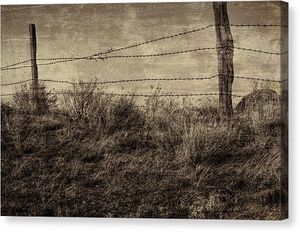Template:Featured Tune: Difference between revisions
No edit summary |
No edit summary |
||
| (88 intermediate revisions by the same user not shown) | |||
| Line 1: | Line 1: | ||
__NOABC__ | __NOABC__ | ||
__NOTITLE__ | __NOTITLE__ | ||
<p><font face=" | <p><font face="sans-serif" size="3"> | ||
<div style="text-align: justify; direction: ltr; margin-left: | <div style="text-align: justify; direction: ltr; margin-left: 2pX; margin-right: 2px;"> | ||
[[File: | [[File:barbed.jpg|300px|thumb|left|Fenced In, by Bonnie Bruno]] | ||
On November 24, 1874, Joseph F. Glidden of DeKalb, Illinois, was granted a patent for fencing material consisting of barbs wrapped around a single strand of wire and held in place by twisting that strand around another. His original double-strand design, the Winner, lived up to its name; it is the most commercially successful of the hundreds of eventual barbed wire designs. Glidden was also the winner in a welter of litigation that reached all the way to the Supreme Court after some dozen other inventors claimed legal priority. Barbed wire was not immediately successful in Texas and elsewhere, especially with smaller cattle ranchers who depended on an 'open range' to sustain their operations. Their opposition led to the barbed wire conflicts of the 1880's, but eventually the ranges were fenced off. Although open range became a thing of the past, barbed wire helped cattlemen to breed herds in protected environments, thus negating the reliance on long-horned cattle that were more suitable to the open range. | |||
</div> | </div> | ||
</font></p> | </font></p> | ||
---- | ---- | ||
[[Annotation: | [[Annotation:Texas_Barbed_Wire|TEXAS BARBED WIRE full Score(s) and Annotations]] and [[Featured_Tunes_History|Past Featured Tunes]] | ||
[[File:Texas barbed wire g.mp3|left]] | |||
{{break}} | |||
*Played By: Jon Bekoff | |||
---- | ---- | ||
<div class="noprint"> | <div class="noprint"> | ||
{{#widget:SoundCloud |id= | <!-- {{#widget:SoundCloud |id=211669164}} --> | ||
<!--{{#ev:youtube| | <!-- {{#ev:youtube|hIH1FKXdrU8|dimensions=200x100}} --> | ||
</div> | </div> | ||
---- | ---- | ||
<div class="no mobile"> | |||
X:1 | X:1 | ||
T: | T:Texas Barbed Wire | ||
M:C | M:C| | ||
L:1/8 | L:1/8 | ||
R: | R:Reel | ||
Q:"Fast" | |||
K:G | K:G | ||
EE|D2+slide+B2 BcBG-|D2 [DB]A BdBG-|E3 [Ec]B cdcG-|E2 [Ec]B cdcG-| | |||
DD +slide+BA BcBG-|DD BA BdBG|AFAB cBAc|BG[GB][GB][G2B2]:| | |||
Bc|dg[dg]f gfga|b2g2- gg-fg|abag fefg|a2f4Bc| | |||
dg[dg]f gfga|b2g2- ge-fg|abae- fd[d2f2]|1 [B3g3][Bg] [Bg]dBc:|2[B3g3][Bg] [Bg]:| | |||
</div> | |||
Latest revision as of 17:08, 8 June 2019

On November 24, 1874, Joseph F. Glidden of DeKalb, Illinois, was granted a patent for fencing material consisting of barbs wrapped around a single strand of wire and held in place by twisting that strand around another. His original double-strand design, the Winner, lived up to its name; it is the most commercially successful of the hundreds of eventual barbed wire designs. Glidden was also the winner in a welter of litigation that reached all the way to the Supreme Court after some dozen other inventors claimed legal priority. Barbed wire was not immediately successful in Texas and elsewhere, especially with smaller cattle ranchers who depended on an 'open range' to sustain their operations. Their opposition led to the barbed wire conflicts of the 1880's, but eventually the ranges were fenced off. Although open range became a thing of the past, barbed wire helped cattlemen to breed herds in protected environments, thus negating the reliance on long-horned cattle that were more suitable to the open range.
TEXAS BARBED WIRE full Score(s) and Annotations and Past Featured Tunes
- Played By: Jon Bekoff
X:1 T:Texas Barbed Wire M:C| L:1/8 R:Reel Q:"Fast" K:G EE|D2+slide+B2 BcBG-|D2 [DB]A BdBG-|E3 [Ec]B cdcG-|E2 [Ec]B cdcG-| DD +slide+BA BcBG-|DD BA BdBG|AFAB cBAc|BG[GB][GB][G2B2]:| Bc|dg[dg]f gfga|b2g2- gg-fg|abag fefg|a2f4Bc| dg[dg]f gfga|b2g2- ge-fg|abae- fd[d2f2]|1 [B3g3][Bg] [Bg]dBc:|2[B3g3][Bg] [Bg]:|
